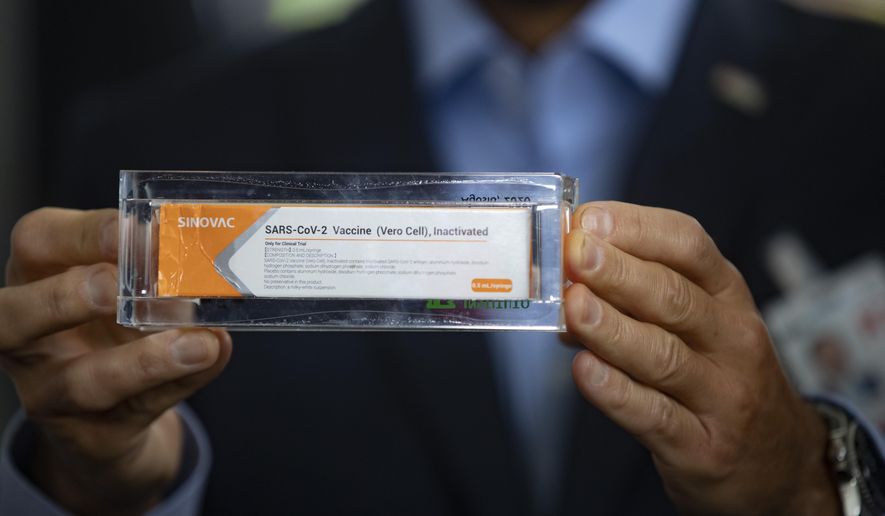Roughly 7 million Americans have received the Pfizer or Moderna coronavirus vaccine but rival superpowers in Moscow and Beijing are using their own shots to immunize their citizens and engage in a form of inoculation diplomacy.
China and Russia have faced questions about the rigor of their clinical trials, but their pushes reflect an attempt to expand their influence on the world stage while filling the vacuum left by Western countries who snapped up doses from top drugmakers.
“Russia and China are using vaccines as a political tool. They want to build and enhance their reputation in Africa and the Middle East, in poor countries that they hope, ultimately, to do deals with for natural resources,” said Arthur Caplan, director of the division of medical ethics at the New York University Grossman School of Medicine.
Beijing is pushing to immunize 50 million Chinese residents with its Sinopharm and Sinovac vaccines ahead of the Lunar New Year, while Indonesia on Monday approved the Sinovac version for emergency use.
Russia, meanwhile, sent 300,000 doses of its Sputnik V vaccine to Argentina and Moscow’s direct-investment fund announced Monday that the Palestinian health ministry registered the vaccine and will accept shipments in the first quarter of this year.
“We are happy that on top of Europe, Africa, Asia and Latin America, Sputnik V will now also be present in the Middle East. This will allow us to further combine forces for a quicker joint victory over the coronavirus infection by guaranteeing access to an effective and safe vaccine for more countries and their people,” said Kirill Dmitriev, CEO of the Russian Direct Investment Fund.
Russia and China are doling out vaccines as they face charges of rogue behavior, from cyber-hacking to human-rights violations and anti-democratic crackdowns.
“After hacking the world’s research labs and launching a flood of propaganda, they are now engaged in global inoculation diplomacy,” said Patrick Cronin, the Asia-Pacific security chair at the Hudson Institute in Washington. “Russia and China want to deflect blame from their oppressive and at times brutal ways. But more generally, they want to enhance their authority at home and abroad, especially if it comes at the expense of the country that has dominated international security since the end of World War II — the United States.”
In some ways, these nations are filling the void left by rich countries that are ahead of the game in launching vaccines. Data compiled by Statista show as of mid-December, rich nations representing 14% of the world’s population — including the U.S., U.K., Australia, Japan, Switzerland, Israel and the European Union — had struck deals securing over half, or 53%, of the initial supply of vaccines.
“Just because Moscow and Beijing want to sand the sharp edges off their autocratic reputations doesn’t mean they are not also providing a global public good,” Mr. Cronin said. “The world needs all the safe and effective vaccine it can get to make COVID-19 seem like just another seasonal flu. We need to monitor their outreach activities, especially when it involves either America’s partners or potential adversaries. But like a vaccine itself, the shelf-life of vaccine diplomacy is also likely to be limited.”
Aside from politics, scientists are worried that places like Russia and China haven’t been transparent as they shop around their vaccines. Brazil and Turkey are testing China’s Sinovac vaccine and say it is effective, but the Chinese haven’t produced much independent data.
“It’s a lot of what I would call testimonials. ‘Believe us, it works.’ Maybe it does,” Dr. Caplan said. “They’re moving their vaccines out to other countries without the safeguards and transparency we really should expect and demand.”
The U.S., Canada and western European nations are employing a high regulatory bar in vetting vaccines from global drugmakers like AstraZeneca and Pfizer. For instance, the Food and Drug Administration balked at talk of delaying the second dose of the two-dose vaccines to maximize early supply, saying it shouldn’t stray from what’s been proven to work.
However, Russia on Monday said it wants to know if a one-dose “Sputnik Light” vaccine is effective so it can distribute more doses to countries struggling with the virus, according to Reuters.
The investment fund said a two-dose regimen will remain the standard in Russia, a move that Dr. Caplan called “suspicious.”
“Because you’re basically experimenting on people,” he said, “taking advantage of their desperation.”
• Tom Howell Jr. can be reached at thowell@washingtontimes.com.




Please read our comment policy before commenting.